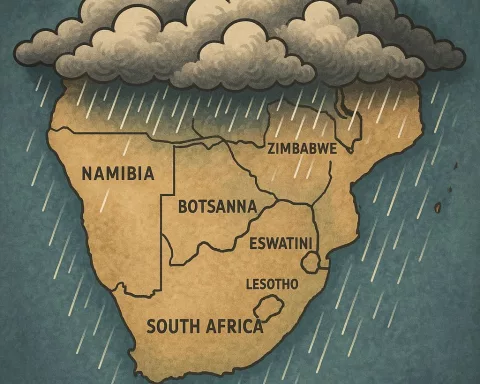Cape Town is bracing for a scorching heatwave, with temperatures expected to soar from April 3rd to 6th. Residents are urged to stay cool by drinking lots of water, wearing light clothing, and avoiding the sun during peak hours. Special care should be taken for the elderly and young children, along with pets, who need shade and fresh water. Everyone is encouraged to watch for fire risks and report emergencies to keep the community safe during this intense heat.
What precautions should Cape Town residents take during the heatwave?
Residents of Cape Town should stay hydrated, avoid prolonged sun exposure, and wear lightweight clothing. It’s essential to use cooling methods like spray bottles and cool baths. Additionally, monitor vulnerable populations and report any fire risks immediately to ensure community safety during the heatwave.
Impending Heatwave and Its Affected Regions
The City of Cape Town’s Disaster Risk Management Centre (DRMC) has announced a high alert due to an upcoming heatwave predicted by the South African Weather Service (SAWS). The forecast indicates extremely high temperatures from Thursday, 3 April, to Sunday, 6 April. Regions including the Cape Winelands, West Coast, the interior of Namakwa, and the City of Cape Town are expected to experience these elevated temperatures. On Thursday, parts of the Cape Metropole might see temperatures soar to around 33°C.
This heatwave coincides with the highly anticipated Two Oceans Marathon, a significant event in Cape Town’s annual calendar. Sonica Lategan, spokesperson for the DRMC, urges both participants and the general public to exercise caution. The advice is straightforward and crucial: stay hydrated and avoid prolonged exposure to the intense heat to prevent heat-related illnesses.
Practical Guidelines for Coping with the Heat
The DRMC has outlined several practical guidelines to help the public navigate the impending heatwave effectively. They emphasize the importance of drinking plenty of water as the foremost recommendation. Another useful tip is to use spray bottles filled with water for an immediate cooling effect. For those who find carrying a wet cloth cumbersome, submerging feet in cold water can help regulate body temperature by improving blood circulation.
Public spaces such as malls and libraries offer a respite from the relentless heat, acting as cooling shelters. Lategan also highlights the importance of wearing wide-brimmed hats and lightweight, loose clothing to enhance air circulation. Cool showers or baths can further help lower body temperature, making the heat more bearable.
Timing outdoor activities is crucial. The DRMC advises that early mornings or late evenings are the best times for exercise or other physically demanding activities. Additionally, recognizing the symptoms of heat-related illnesses is vital. Symptoms can include muscle cramps, heavy sweating, nausea, dizziness, fainting, confusion, rapid pulse, and elevated body temperature. Immediate medical attention is essential if these symptoms appear.
Special Attention for Vulnerable Populations and Fire Risk
The heatwave poses a heightened risk to vulnerable segments of the population. Lategan stresses the need for vigilant monitoring of the elderly, pregnant women, and young children, as they are particularly susceptible to high temperatures. Pets also require adequate shade and fresh water during this period to ensure their well-being.
Another pressing concern during a heatwave is the increased risk of wildfires. Dry and hot conditions can quickly turn a small spark into a raging inferno. Being proactive and vigilant about any signs of fire is crucial. The public should report emergencies immediately to the City’s Public Emergency Communication Centre by dialing 021 480 7700 from a mobile phone or 107 from a landline.
The Global Context and Urban Strategies
Cape Town’s response to the heatwave mirrors global urban strategies for managing heat stress. Cities around the world are grappling with rising temperatures, a phenomenon exacerbated by climate change. Historical and artistic movements have often depicted humanity’s struggle against natural forces, from the Romantic era’s portrayal of turbulent landscapes to modern art’s abstract expressions of environmental crises.
In this context, Cape Town’s proactive measures reflect an understanding of the urgent need for both immediate and systemic responses. On a larger scale, urban planning and architecture are increasingly incorporating heat-mitigation strategies. Green roofs, urban forests, and high-albedo materials that reflect, rather than absorb, heat are becoming standard features in forward-thinking cities.
Cape Town itself has launched several initiatives aimed at enhancing its resilience to extreme weather. Integrating public parks and promoting green spaces within the urban fabric are practical steps toward mitigating the heat island effect. These efforts are part of a broader movement toward sustainable urban living, acknowledging the intricate interplay between human activity and environmental health.
Historical Context and Contemporary Challenges
The heatwave advisory also evokes memories of historical episodes of extreme weather and their impact on urban populations. For instance, the deadly heatwave that hit Europe in 2003 claimed thousands of lives and prompted a reevaluation of public health preparedness. Similarly, Cape Town’s current advisory serves as a reminder of the ongoing relevance of weather phenomena in shaping human experiences.
The Two Oceans Marathon, a symbol of endurance and resilience, ironically takes place against the backdrop of this climatic challenge. This race has long celebrated human spirit and athletic prowess, drawing participants from across the globe. In the face of extreme heat, the event underscores the importance of preparation, caution, and the inherent unpredictability of nature.
Cape Town’s situation is a microcosm of a global reality. As cities expand and populations grow, the challenges posed by climate change become more pronounced. Urban centers, traditionally seen as hubs of progress and innovation, now find themselves at the frontline of climate adaptation. This dual role—both as beneficiaries and victims of modernity—adds a layer of complexity to urban governance.
A Call for Collective Action
The dialogue between historical context and present-day reality enriches our understanding of Cape Town’s current predicament. From the Renaissance’s rediscovery of nature to the Industrial Revolution’s environmental costs, humanity’s relationship with the natural world has always been dynamic. In contemporary times, this relationship necessitates a balanced approach, blending technological advancements with ecological mindfulness.
Moreover, public engagement and community participation emerge as key elements in effective disaster management. The dissemination of practical advice and the fostering of a culture of preparedness can significantly enhance resilience at the grassroots level. Cape Town’s advisory, in its essence, is not just a directive but an invitation for collective action.
While the absence of a definitive ending may seem unorthodox, it aligns with the ongoing nature of the challenge. Cape Town, like many cities worldwide, must continuously adapt and evolve in response to climatic uncertainties. The narrative of resilience is, after all, a continual one, marked by both triumphs and trials, each chapter contributing to the overarching story of human endurance.
“`markdown
What dates will the heatwave affect Cape Town?
The heatwave is expected to impact Cape Town from April 3rd to April 6th. During this period, temperatures are forecasted to rise significantly, particularly in various regions including the Cape Winelands and the West Coast.
What precautions should residents take during the heatwave?
Residents are advised to stay hydrated, wear lightweight and loose clothing, and avoid prolonged exposure to the sun. Utilizing spray bottles with water, taking cool baths, and timing outdoor activities for early mornings or late evenings can also help combat the heat.
Who are the vulnerable populations that need special attention during the heatwave?
Special care should be given to the elderly, young children, and pregnant women as they are particularly susceptible to high temperatures. Pets should also be monitored to ensure they have adequate shade and fresh water to stay cool.
What should people do if they notice fire risks during the heatwave?
With the heightened risk of wildfires during the heatwave, residents are urged to be vigilant about any signs of fire. Emergencies should be reported immediately to the City’s Public Emergency Communication Centre by dialing 021 480 7700 from a mobile phone or 107 from a landline.
How can residents cope with the heat in public spaces?
Public spaces such as malls and libraries can serve as cooling shelters. Additionally, wearing wide-brimmed hats, taking cool showers, and using wet cloths can help individuals regulate their body temperature and find relief from the heat.
What are the broader implications of this heatwave for Cape Town in the context of climate change?
The upcoming heatwave highlights the urgent need for cities like Cape Town to adapt to climate change. Urban planning initiatives, such as integrating green spaces and using heat-mitigating materials, reflect a growing awareness of the relationship between urban living and environmental health. This situation invites collective action and community participation to enhance resilience against future climatic challenges.
“`












